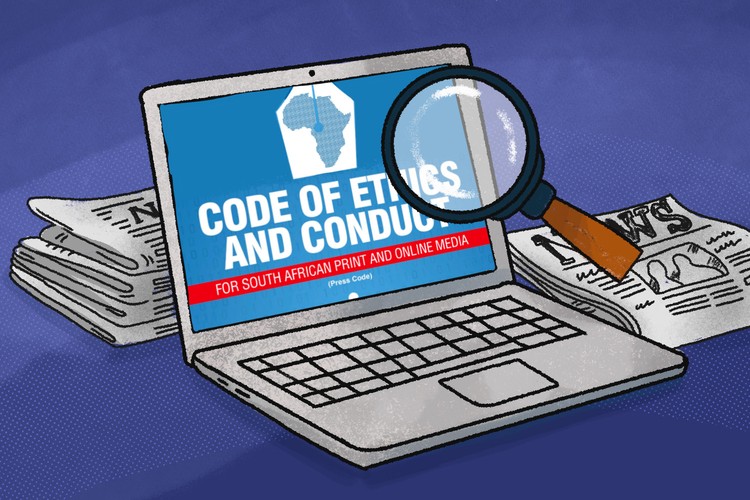
6 December 2024
The Press Ombud ruled that Sunday World breached the press code when it claimed AfriForum did not condemn farm murders when the victims were black. Illustration: Lisa Nelson
In a piece that runs to just 100 words, excluding the title, Sunday World managed to breach a clause of the Press Code twice. Titled “Moegoe: Afriforum makes noise all the time”, the piece sought to make a simple point: that AfriForum’s differing responses to farm murders, seemingly on the basis of race, is hypocritical, making the organisation worthy of being labelled the Moegoe of the Week. But in doing so, Sunday World got two important facts wrong.
The first of these is that AfriForum has claimed that there is a genocide of white farmers in South Africa. The second is that “when it comes to black people being murdered on farms by whites”, AfriForum officials “refuse to cry foul”.
In upholding the complaint that the article breached clause 1.1 of the Press Code, which requires the media to “take care to report news truthfully, accurately and fairly”, the Deputy Press Ombud found that neither of the two statements was truthful.
In respect of the first inaccuracy, Sunday World quickly accepted that it had erred. It agreed “that previous rulings by the Press Council … have found the claim without foundation”.
But in respect of the second one, it took the view that its claim was valid because AfriForum “proactively condemns murders of white people but only makes a statement after inquiry when black people are involved”.
The referenced statement, reported in another article published by Sunday World on the same day, stated: “AfriForum CEO in Limpopo, Kallie Kriel whose organisation has been vocal against the murder of white farmers, said they condemned all murders in the strongest possible terms, irrespective of the race of the victims and who the murderers are.”
That article focused on the case in which 60-year-old farm owner Zachariah Johannes Olivier, 19-year-old Andrian Rudolph de Wet, and Zimbabwean farmworker William Musora were arrested for the murder of two black women whose “decomposed bodies … were discovered in a pigsty”.
AfriForum relied on this to rebut the allegation that it had refused to condemn farm murders when these involved black victims.
In dealing with the second inaccuracy, the Deputy Ombud characterised it as a factual claim made in the context of an opinion piece, which – as the Press Council has made clear – needs to be justified. In the Deputy Ombud’s view, “the word ‘refuse’ clearly means to decline entirely”. Even if Sunday World considered the statement to be insufficient, AfriForum “cannot be said to have ‘refused’ to say anything”.
AfriForum also alleged breaches of clauses 1.2 and 1.3 of the Press Code.
Clause 1.2 requires the media to “present news in context and in a balanced manner, without any intentional or negligent departure from the facts whether by distortion, exaggeration or misrepresentation, material omissions, or summarisation”. Clause 1.3 requires them to “present only what may reasonably be true as fact” with “opinions, allegations, rumours or suppositions … presented clearly as such”.
Both of these claims were dismissed.
AfriForum claimed that the article breached clause 1.2 by accusing it of having double standards. According to the organisation, “its condemnation of all murders on farms in fact shows consistency”.
The Deputy Ombud disagreed, characterising the accusation of double standards as an opinion to which Sunday World is entitled.
This writer shares that opinion: Kriel’s insipid statement, which condemned all murders, and was offered only in response to a journalist’s question, lends itself to being interpreted in the manner that it was by Sunday World.
In respect of the claimed breach of clause 1.3, AfriForum considered the reference in the article to its alleged refusal to cry foul as opinion being presented as fact. The Deputy Ombud correctly dismissed that part of the complaint, noting that “the claim of a refusal to condemn the murder of black people is presented as a fact”. Having found that allegation to be false, in breach of clause 1.1, it was simply not possible to find a breach of clause 1.3, because it cannot be both fact and opinion.
Sunday World has been directed to publish an apology, and to correct the report, and to do both in print and online. As is ordinarily required with such forms of relief ordered by the Press Ombud, Sunday World is to publish both a brief summary of the ruling, and a link to the ruling, and to submit its proposed text to the Deputy Ombud for approval prior to publication.